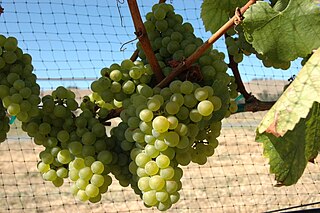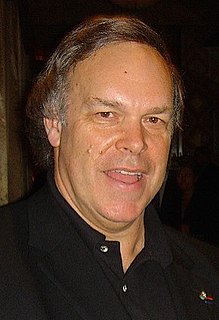
Fortified wine is a wine to which a distilled spirit, usually brandy, has been added. In the course of some centuries, winemakers have developed many different styles of fortified wine, including port, sherry, madeira, Marsala, Commandaria wine, and the aromatised wine vermouth.

Chardonnay is a green-skinned grape variety used in the production of white wine. The variety originated in the Burgundy wine region of eastern France, but is now grown wherever wine is produced, from England to New Zealand. For new and developing wine regions, growing Chardonnay is seen as a 'rite of passage' and an easy entry into the international wine market.

Retsina is a Greek white resinated wine, which has been made for at least 2,000 years. Its unique flavor is said to have originated from the practice of sealing wine vessels, particularly amphorae, with Aleppo Pine resin in ancient times. Before the invention of impermeable glass bottles, oxygen caused many wines to spoil within the year. Pine resin helped keep air out, while infusing the wine with resin aroma. The Romans began to use barrels in the 3rd century AD, removing any oenological necessity for resin, but the flavor itself was so popular that the style is still widespread today.
Commandaria is an amber-coloured sweet dessert wine made in the Commandaria region of Cyprus on the foothills of the Troödos mountains. Commandaria is made from sun-dried grapes of the varieties Xynisteri and Mavro. While often a fortified wine, through its production method it often reaches high alcohol levels, around 15%, already before fortification. It represents an ancient wine style documented in Cyprus back to 800 BC and has the distinction of being the world's oldest named wine still in production, with the name Commandaria dating back to the crusades in the 12th century.

Robert McDowell Parker Jr. is a retired U.S. wine critic. His wine ratings on a 100-point scale and his newsletter The Wine Advocate are influential in American wine buying and are therefore a major factor in setting the prices for newly released Bordeaux wines. This made him the most widely known and influential wine critic in the world.

Grappa is an alcoholic beverage: a fragrant, grape-based pomace brandy of Italian origin that contains 35 to 60 percent alcohol by volume. Grappa is traditionally produced in Northern Italy and is also widely consumed in places such as Argentina, Bulgaria, Georgia (chacha), Uruguay, Galicia and Portugal.

Terroir is a French term used to describe the environmental factors that affect a crop's phenotype, including unique environment contexts, farming practices and a crop's specific growth habitat. Collectively, these contextual characteristics are said to have a character; terroir also refers to this character.

The subjective sweetness of a wine is determined by the interaction of several factors, including the amount of sugar in the wine, but also the relative levels of alcohol, acids, and tannins. Sugars and alcohol enhance a wine's sweetness; acids (sourness) and bitter tannins counteract it. These principles are outlined in the 1987 work by Émile Peynaud, The Taste of Wine.

Cypriot cuisine is a Mediterranean cuisine. It is also influenced by other subsets such as French and Italian cuisine.
The Paris Wine Tasting of 1976, also known as the Judgment of Paris, was a wine competition organized in Paris on 24 May 1976 by Steven Spurrier, a British wine merchant and his colleague, Patricia Gallagher, in which French judges carried out two blind tasting comparisons: one of top-quality Chardonnays and another of red wines. A Californian wine rated best in each category, which caused surprise as France was generally regarded as being the foremost producer of the world's best wines. Spurrier sold only French wine and believed that the California wines would not win.
A wine competition is an organized event in which trained judges or consumers competitively rate different vintages, categories, and/or brands of wine. Wine competitions generally use blind tasting of wine to prevent bias by the judges.

The following outline is provided as an overview of and topical guide to wine
George McCaffrey Taber is a journalist and entrepreneur.
Napa Valley AVA is an American Viticultural Area located in Napa County in California's Wine Country. Napa Valley is considered one of the premier wine regions in the world. Records of commercial wine production in the region date back to the nineteenth century, but premium wine production dates back only to the 1960s.

The Cypriot wine industry ranks 50th in the world in terms of total production quantity, and much higher on a per-capita basis. The wine industry is a significant contributor to the Cypriot economy through cultivation, production, employment, export and tourism.

Schliengen is a town in southwestern Germany in the state of Baden-Württemberg, in the Kreis (district) of Lörrach. Schliengen's claim to international fame is the Battle of Schliengen, fought between forces of the French Revolutionary army under Jean-Victor Moreau and the Austrian army under Karl von Österreich-Teschen. As both sides claimed victory, the battle is commemorated on a monument in Vienna and on the Arc de Triomphe in Paris.
David Peppercorn is a British Master of Wine, French wine importer and author, known for his books about the wines of Bordeaux and long experience in his field, having collected tasting notes since the late 1950s. He is married to fellow MW and wine writer Serena Sutcliffe. They were the first husband and wife team to both earn the qualification of Master of Wine. He has three daughters by a previous marriage. Peppercorn's books include Bordeaux, The Wines of Bordeaux, The Simon & Schuster Pocket Guide to the Wines of Bordeaux, Mouton-Rothschild 1945, The Wine To End All Wars and Great Vineyards and Winemakers.

Wine tasting is the sensory examination and evaluation of wine. While the practice of wine tasting is as ancient as its production, a more formalized methodology has slowly become established from the 14th century onward. Modern, professional wine tasters use a constantly evolving specialized terminology which is used to describe the range of perceived flavors, aromas and general characteristics of a wine. More informal, recreational tasting may use similar terminology, usually involving a much less analytical process for a more general, personal appreciation.

Koilani is a village in the Limassol District of Cyprus, located 3 kilometres (1.9 mi) south of Pera Pedi.













